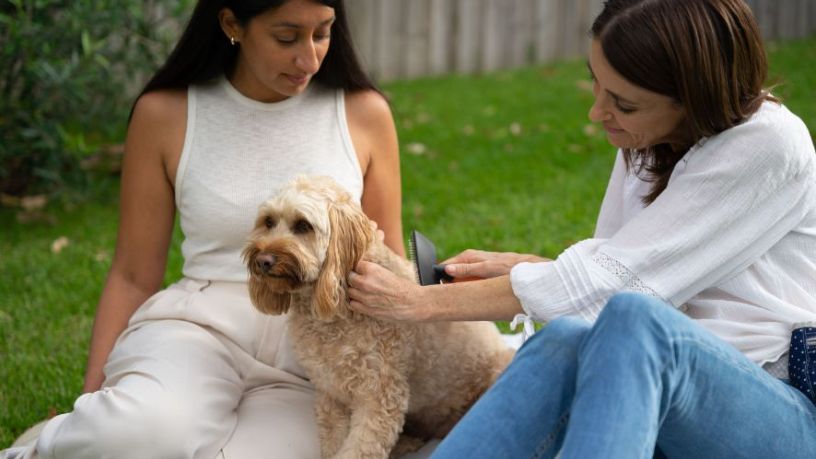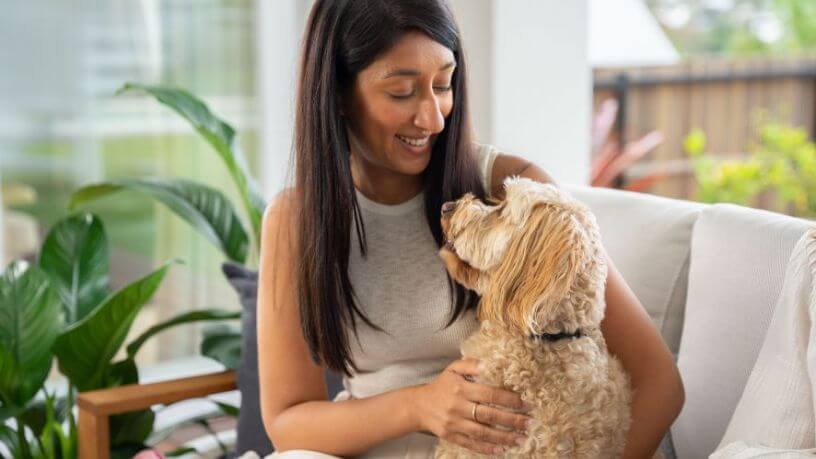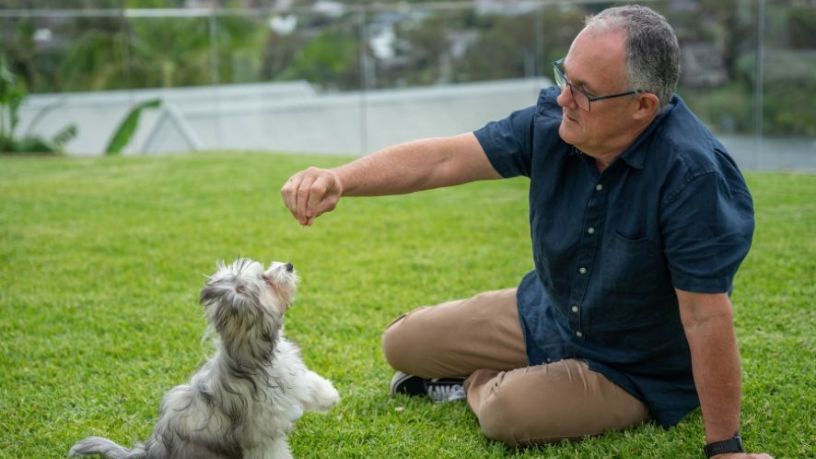Before getting a dog, do some research about breeds to decide the type of pet that will best suit your home and lifestyle.
Key takeaways
Do your research to decide whether you’d prefer to adopt a rescue dog or buy from a reputable breeder.
Dogs need vaccinations, regular health and dental checks, and sometimes emergency treatments, all of which can be expensive. Make sure you organise pet insurance to help with the expense.
So, you’ve decided to get a dog. Congratulations! Life is about to get a whole lot more fun. But how do you pick the dog that’s right for you?
Things like lifestyle, family, living situation and more should all be factored in when choosing a dog breed. Even decisions like whether to adopt a dog from a shelter or go to a breeder need to be considered. Let us help you figure out how to choose a dog breed that will be a great fit for you.
Choosing a dog breed
When the time comes to pick the dog breed that’s right for you, there are many factors to consider. Each breed has unique characteristics, temperament, and activity level, and while every individual dog is different, there are some breed-specific traits you should keep in mind.
When you’re choosing a dog breed, ask yourself these questions:
- What is your home or living space like? Dogs can range in size from a few kilos to more than 100kg (for example, English mastiffs), and a huge dog may not be best suited to a studio apartment.
- Do you have a yard or a nearby dog-friendly park? All dogs need exercise, but high-energy breeds will need space and the opportunity to run.
- What level of grooming are you willing to commit to? Dogs with longer coats need more regular and intensive grooming, whether you do it yourself or take them to a professional (which comes with an additional cost factor). Dogs that don’t shed their hair, such as poodles and poodle-cross breeds, will need regular clipping, preferably by a professional groomer.
- Do you or anyone living in your home have allergies? You may need to think about whether getting a dog is a good idea at all, or consider a breed that doesn’t shed, such as poodles and other poodle-cross breeds (labradoodles, groodles, bordoodles and cavoodles, for example).
- Why are you getting a dog? This can also play a pick big role in choosing a dog breed. Do you want an exercise buddy? A high-energy breed like a kelpie could be a good pick. Are you looking for a furry friend for your kids? Cavalier King Charles spaniels, border terriers and Hungarian vizslas are all known to be gentle with children.
- How much time will you spend with your dog each day, and will they be home alone much? Some breeds, such as greyhounds and whippets, need a daily burst of exercise, but are very happy to sleep and lounge around for many hours a day.
- How much time and money can you commit to ongoing care? Some dog breeds with exaggerated features are at risk of ongoing health problems. Brachycephalic (flat-faced) dogs such as pugs and French Bulldogs can develop breathing difficulties and eye problems1, while dachshunds can experience back problems.2
Should I adopt a dog or buy from a breeder?
The breeder versus shelter question is one worth proper consideration, and there are things you need to know about both when deciding what suits you.
As most rescue dogs are fully grown, they are likely to have lower energy levels than new puppies. You can already see how big they will grow, and the staff at the shelter will be able to give you a sense of their personality so you can gauge whether they’ll be a good fit for you. Adopting a rescue dog may also very well mean you’re saving a life.
However, some dogs in need of re-homing may have had a traumatic past, which can lead to challenging behaviours and difficulties introducing them to new things. If they’re untrained (including toilet training), it can be trickier (though by no means impossible) to teach at a later age.
When you pick a puppy from a breeder, you raise it from a very young age and have more control over its training. Your breeder can also give you a detailed history of its parents’ characteristics and personality. Of course, a puppy from a shelter is also something of a blank canvas, however there could be much less known about its parentage or breed.
However, pure bred and purpose cross-bred puppies are much more expensive than rescue dogs. It’s also critical to do your research and ensure you’re buying from a responsible, ethical breeder, for both your and your puppy’s sake.
Whether you pick a puppy from a breeder or adopt a dog from a shelter or rescue centre, remember to ask the seller any questions you might have. For a rescue dog, you might wish to ask:
- the dog’s age
- if the rescue centre knows their backstory
- what they’re like around kids and other dogs
- what (if anything) makes them anxious or aggressive
- if they have any health or dental issues.
It can also be a good idea to ask to spend some time with the dog and take it for a walk to see how it reacts to you, other dogs and people away from the shelter environment.
If you’re buying from a breeder, ask to visit their facility to check the pup has been bred in clean, comfortable conditions and that the mother and other puppies look happy and healthy.
Ask questions about the parents’ and other puppies’ temperaments (you may also like to ask to meet the parents and other litters) and check they’ve been microchipped and are up to date with their flea and worming treatment and vaccinations. You may even like to ask to have the puppy checked by your own vet before purchase.
Selecting a new furry family member is an exciting time, but choosing a dog breed and figuring out where you’ll purchase your pooch is something that takes a lot of consideration. When you do pick the dog that’s right for you, remember to get Bupa Pet Insurance to keep them safe and protected through all your adventures together.

At Bupa, trust is everything
Our health and wellbeing information is regularly reviewed and maintained by a team of healthcare experts, to ensure its relevancy and accuracy. Everyone's health journey is unique and health outcomes vary from person to person.
This content is not a replacement for personalised and specific medical, healthcare, or other professional advice. If you have concerns about your health, see your doctor or other health professional.
1RSPCA. (2022). What do I need to know about Brachycephalic dogs?. RSPCA.
2RSPCA. (2017). The Pugly Truth: Why you should choose healthy over cute every time. RSPCA.
You might also like...
The essential dog grooming guide
Whether you’re giving them the usual brush, bath and trim or treating them to some TLC, it’s important to know how to safely and effectively groom your dog.
5 golden rules for dog training
Time to teach your dog the house rules? We’ve put together 5 tips to help make obedience training easy, stimulating, and a lot of fun for your fur-baby!
How to train your dog the right way
Done right, training can improve your pup’s confidence, help you create a loving and healthy bond, and be a lot of fun! But which training style is best?
Introducing dogs to newborn babies
Spending some time preparing your fur baby to meet your newborn can reduce any stress or risks and help them build a safe and positive relationship.





